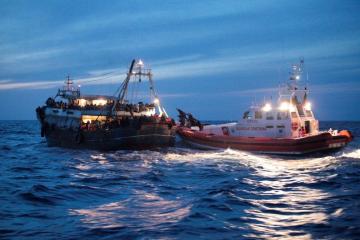Fundamental rights at the EU’s southern sea borders: Deficiencies, promising practices and challenges

It describes the hazardous journey and deaths at sea, discusses current maritime surveillance mechanisms and cooperation with third countries, and details the treatment of migrants when they arrive on shore. A final chapter is devoted to sea operations coordinated by the EU’s border control agency (Frontex), and to EU solidarity mechanisms.
European Home Affairs Commissioner Cecilia Malmström: “I very much welcome FRA’s report on fundamental rights issues at the EU’s southern sea borders. It identifies the difficulties migrants face during their journey and the serious and urgent challenges they come up against after their arrival. The right to life and respect for the principle of non-refoulement are core fundamental rights, and the European Union as well as Member States must do everything they can to ensure these rights are implemented to the full. FRA’s report provides concrete proposals on how this can be achieved.”
While many reports discussing this issue focus on a particular incident at just one border crossing, FRA has collected exhaustive data on the four countries to which the majority of migrant boats arrive (Spain, Italy, Greece and Malta). Sources included border guards, fishermen, and migrants themselves. The large scope of the research and broad range of interview partners enabled FRA to list promising as well as bad practices, and indicate where policymakers need to act in order to increase the fundamental rights protection of migrants when they arrive in the EU.
“The EU and its Member States must ensure that border surveillance and management, while necessary, are not detrimental to the fundamental rights of migrants arriving at our shores,” said FRA Director Morten Kjaerum. “There are many reasons for people to venture the journey to Europe. Some are making use of their fundamental right to seek refuge from persecution in their home countries; some are looking for a better life for themselves and their families; and some, particularly women and girls, are being trafficked against their will. But whatever the context of their arrival, we expect migrants entering the EU to be afforded the same rights and treated with the same dignity accorded to any other person.”
There have been considerable changes in the patterns of migration by sea over the last 10 years. Arrivals rose significantly in 2011 following the Arab Spring, before dropping again in 2012:
Figure 1: Data trends (2001–2012) for Greece, Spain, Italy and Malta
FRA’s new report makes a total of 50 suggestions, targeted at EU and national policymakers, on means of improving fundamental rights protection at the EU’s sea borders. These include:
- The EU should develop clear guidance on where to disembark migrants intercepted or rescued at sea, particularly for Frontex-coordinated operations. This guidance must include a ban on the return of migrants to third countries if this could put them in danger of inhuman or degrading treatment.
- The planned border surveillance platform Eurosur has life-saving potential, as it is likely to be able to provide information on boats or people in grave danger and requiring immediate assistance. This potential must be fully utilised.
- Practical steps need to be taken by those using the Eurosur system to avoid the unintentional storing and sharing of personal data. An existing safeguard against the sharing of information with third countries, which could expose migrants to the risk of inhuman or degrading treatment or punishment, must be translated into practice.
- Frontex has recently taken significant steps towards protecting fundamental rights. However, there are still aspects that remain to be addressed, for example paying greater attention to fundamental rights in the pre-deployment briefings given to officers before each operation.
- It is important to ensure that practical training for border officers fully integrates fundamental rights issues from the very beginning, particularly the knowledge that returning a person to persecution, torture or other serious harm is prohibited.
- Fundamental rights expertise should be brought in at key stages of the planning, implementation and evaluation of projects using funds that the EU provides for the management of external borders.
>> The full report can be downloaded here: Fundamental rights at the EU's southern sea borders
Notes to editors:
- The principle of non-refoulement bans the return of individuals to countries in which they could face persecution, torture or other serious harm.
- FRA co-chairs the Frontex Consultative Forum on Fundamental Rights, which advises the director and management board of Frontex on fundamental rights issues.
- Publications:
- FRA report on the fundamental rights situation of people crossing the Turkish-Greek land border in an irregular manner was published in 2011.
- the results of FRA’s research into the situation of irregular migrants at selected air and land border crossing points into the EU will be published at the end of 2013.
For further information please contact the FRA media team
E-mail: media@fra.europa.eu
Tel.: +43 1 580 30 655
